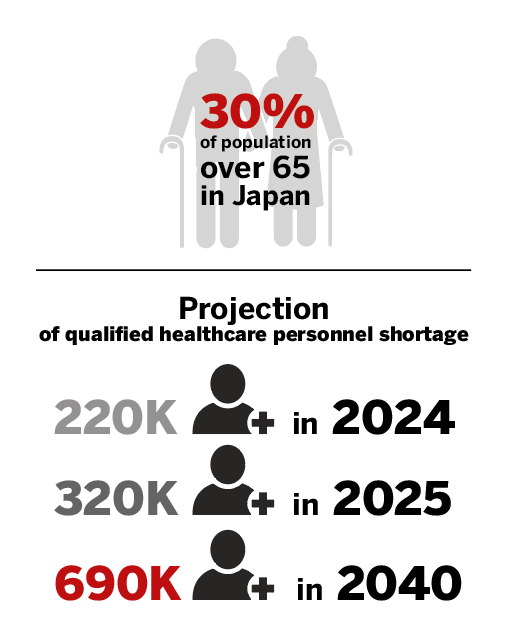Diversity can be a source of strength. The global community almost always benefits from a wealth of voices, ideas and approaches in searching for innovative solutions to today’s increasingly complex challenges. The conundrum, however, is that too many approaches can produce fragmentation when cooperation is needed to solve our most serious problems. Balance is the key. Leaders of nations and businesses are responsible for addressing the challenges within their own domains. Nonetheless, some of our problems are global in scope, and so they must balance those responsibilities with their roles as global citizens and consider if their approaches help or hurt the global community.
One of the most vexing issues facing many nations today is healthcare. Investing in our younger generations is crucial to creating a better, more sustainable world. At the same time, caring for the growing numbers of elderly and infirm is demanding ever-greater resources. Societies with relatively young demographics would be making a mistake by ignoring this dilemma, kicking the can down the road and hoping for some future solution. Because before they know it, they will be facing this same societal problem.

Japan is one society already grappling with going gray. A few decades ago, the island nation was renowned for its soaring economy fueled by its vibrant youth culture and passion for technology. Today, Japan is a super-aging society. Nearly 30 percent of the population is over 65. And as its people have grown older, its costs of care have been rising, along with a growing shortage of qualified healthcare personnel. Projections show that Japan will have 220,000 fewer caregivers than it needs in the next fiscal year, and that gap will widen to 320,000 by FY 2025 and 690,000 by FY 2040. In working to tackle this situation, Japan has important lessons to offer. In the private sector, SOMPO Group is taking Japan’s passion for technology and applying it to a range of social problems, most notably in caring for seniors.
SOMPO has evolved from a traditional insurance firm founded in the late 19th century to a new kind of company that actively partners in research and develops real solutions to society’s problems. Entering the nursing care business in 2015, SOMPO realized it possessed a valuable trove of real data – information gathered from the real world as opposed to online clicks – on those receiving its care. Data alone, however, is one fragmented piece of a larger healthcare puzzle.

To assemble the full picture, SOMPO combines data utilization with digitalization support and professional service in its model for care called the Nursing Care RDP (Real Data Platform). By plugging real data into digital programs, healthcare professionals can more accurately visualize users’ conditions, analyze their needs, and tailor care plans for them. This reduces the workload of caregivers and will also help close the gap in the number of caregivers needed. The Nursing Care RDP is making the nursing care industry more sustainable.
SOMPO didn’t develop this approach on its own. Cooperation was the key. By working with scientists, researchers and technology innovators from new and established firms, SOMPO has been able to deliver better elder care with fewer staff and at significant savings. That represents a major advance toward solving one of Japan’s most concerning social burdens.

Other countries and regions will soon be facing similar situations. The United States already has the third-largest number of senior citizens in the world. Italy, Finland, Portugal and Greece rank second through fifth in the percentage of the population over 65, and as a region, southern Europe is the world’s oldest. Now, SOMPO and its global partners are taking their approach to societies confronting the same issues.
We are all justifiably proud of our individual achievements. But if we all follow our own paths, then we are on a road to nowhere. Cooperation counts. Leadership can make a difference. While respecting our differences, those who hold the reins of power in our nations, businesses and communities must use their influence to bring us together. It is the only viable path to solve the problems common to us all. Otherwise, the goals we espouse at Davos will just be words. Real cooperation will bring us real solutions for a sustainable world.
- The 100 Most Influential People of 2024
- Coco Gauff Is Playing for Herself Now
- Scenes From Pro-Palestinian Encampments Across U.S. Universities
- 6 Compliments That Land Every Time
- If You're Dating Right Now, You're Brave: Column
- The AI That Could Heal a Divided Internet
- Fallout Is a Brilliant Model for the Future of Video Game Adaptations
- Want Weekly Recs on What to Watch, Read, and More? Sign Up for Worth Your Time


